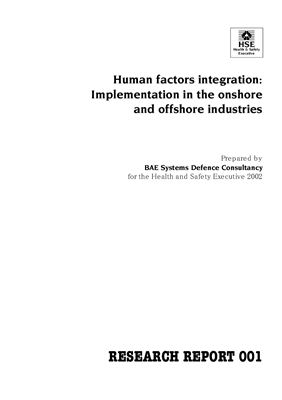HSE books. Prepared by BAE Systems Defence Consultancy. 2002y -41
pages. ISBN 071762529X
This aim of this document is to provide guidance for the integration of Human Factors (HF) principles into the onshore and offshore system design and development process. The guidance contain within, is therefore directed at onshore and offshore systems designers and assessors.
For systems to operate safely and effectively, they must be designed to support the people who operate them. Human factors is regarded by the HSE as having an essential contribution during the development and operation of systems. It is increasingly recognised that human factors issues must be considered as a central part of development thinking. Experience shows that it is ineffective to address them as an afterthought. The risks associated with poor human factors can best be avoided by starting human factors activities as early as possible in the design process and continuing them throughout. This document gives guidance on approaches that assist in placing human factors at the heart of system design and development in the onshore and offshore industries.
Contents:
Introduction
The scope of human factors
Integrating human factors into systems development
The human-centred approach to systems development
Managing human factors integration (hfi)
Involving human factors throughout the development lifecycle
Human factors techniques
Checklist for human factors best practice
This aim of this document is to provide guidance for the integration of Human Factors (HF) principles into the onshore and offshore system design and development process. The guidance contain within, is therefore directed at onshore and offshore systems designers and assessors.
For systems to operate safely and effectively, they must be designed to support the people who operate them. Human factors is regarded by the HSE as having an essential contribution during the development and operation of systems. It is increasingly recognised that human factors issues must be considered as a central part of development thinking. Experience shows that it is ineffective to address them as an afterthought. The risks associated with poor human factors can best be avoided by starting human factors activities as early as possible in the design process and continuing them throughout. This document gives guidance on approaches that assist in placing human factors at the heart of system design and development in the onshore and offshore industries.
Contents:
Introduction
The scope of human factors
Integrating human factors into systems development
The human-centred approach to systems development
Managing human factors integration (hfi)
Involving human factors throughout the development lifecycle
Human factors techniques
Checklist for human factors best practice

